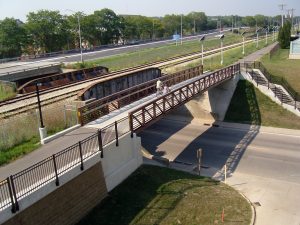On June 30, 2022, the Bipartisan Infrastructure Law (BIL) established the new Reconnecting Communities Pilot (RCP) program.
RCP is a federal reimbursement program dedicated to funding both planning and capital construction projects that address the negative impacts of existing transportation facilities on community connectivity.
“This is the first-ever dedicated federal initiative to repair the harm caused by some of the infrastructure choices of the past, and instead replace them or improve them for projects that bring people together,” commented U.S. Department of Transportation Secretary Pete Buttigieg. “Funding from the $1 billion pilot program will help reconnect communities that were previously cut off from economic opportunities by transportation infrastructure.”
The RCP program has earmarked $1 billion for community award over the next five years, to be allocated both via planning grants as well as capital construction grants.
Planning grants are funded at 80% for a maximum grant award of $2M. Eligible activities include public engagement, feasibility studies, traffic studies, environmental studies, preliminary design/engineering, land use code reform, housing studies, and other planning activities related to removing, retrofitting, or mitigating the impact of an existing transportation facility on community connectivity. Nationally, $50M is available annually during Federal Fiscal Years 2022-2026.
Capital construction grants are funded at 50%; however, other federal funding programs may be utilized to reach a maximum of 80% federal funding. The minimum award is $5M and the maximum award is $100M. Projects must restore community connectivity by removing, replacing, retrofitting, or mitigating an existing transportation facility’s (i.e. highway, railroad, airport, bridge, port, gas pipeline) negative impact to connectivity. Projects may include public transportation, infrastructure removal, pedestrian walkways and conversions, main street revitalization, etc. Nationally, $750M is available (annual funding varies $145M – $155M) during Federal Fiscal Years 2022-2026.
Examples of transportation facilities’ characteristics that result in negative impact on connectivity include traffic volume and/or speeds that create unsafe conditions for crossing; facility design that results in unsafe conditions for crossing; grade separations; lack of pedestrian/bicycle crossings, sidewalks, lanes etc.; design issues that often result in the facility being unusable after severe weather (i.e. frequent flooding).

Thinking of applying? The first deadline for application passed on October 13, 2022. However, it is advised that communities get an early start if they are considering applying for any of the next four rounds of grants. Joint applications are encouraged. The owner of the transportation facility must be the lead applicant, joint applicant, or formally endorse the application.
The program prioritizes disadvantaged communities. This funding utilizes indicators such as income, areas of historic poverty, access to transportation, federally designated community development zones (i.e. Opportunity Zones), and other indicators to determine “disadvantaged” status.
Applications are rated on project readiness and on how they address the following criteria:
- Equity, environmental justice, and community engagement.
- Mobility and community connectivity.
- Community-based stewardship, management, and partnerships.
- Equitable development of shared prosperity.
MSA has assisted many communities apply for and receive ARPA funding and we are here to help prepare, prioritize and submit projects for funding. We continue to monitor funding programs resulting from the BIL and are dedicated to keeping you apprised on how to successfully move projects forward.
Contact us today to get the conversation started.
